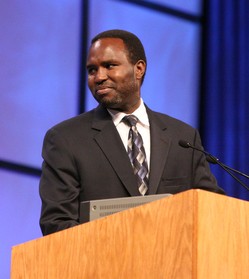The full Assembly seemed quite satisfied with the deliberation in the Ecumenical and Interfaith Relations Committee as members needed just one hour to move through its business, including the two interfaith papers of which they referred one and approved the other.
With a vote of 529-135-9, the 219th General Assembly (2010), approved item 08-09, which referred “Christians and Jews: People of God” back to the Offices of Interfaith Relations and Theology and Worship. The paper has been referred so that future work on it can include more input from Presbyterians of Middle Eastern heritage and Presbyterian partners in Middle Eastern countries.
The Rev. Cynthia Campbell (McCormick Theological Seminary), the Rev. Nanette Sawyer (Chicago Presbytery) and the Rev. John Sweet (Philadelphia Presbytery) were among those who spoke against referring the paper.
The paper on “Understanding Christian-Muslim Relations,” also deemed to be missing input from Middle Eastern Presbyterians, was approved because it specifically called for further study when the other paper did not.
Mohamed Elsanousi, director of communications and community outreach for the Islamic Society of North America, said his community views the PC(USA) with “appreciation and admiration,” adding that he believes the paper will advance the partnership with the church.
Other actions will move the PC(USA) into more dialogue with other expressions of Christian faith. Connections will be explored with the Seventh-day Adventist Church and membership obtained in the relatively young organization called Christian Churches Together (CCT).
In addressing the Assembly, Fr. Leo Walsh, ecumenical advisory delegate from the Catholic Church and staff member of the Conference of U.S. Bishops, said the CCT is not a council of churches and will not even vote on issues, but it welcomes the PC(USA).
“Without you, we would be terribly impoverished,” said Walsh. “There is a vital need for the prophetic Presbyterian voice to be at the table.”
Additional business included:
- Finding that the Evangelical Presbyterian Church (EPC) did not have a denominational strategy to coax PC(USA) congregations to join them.
- Supporting the transition of the World Alliance of Reformed Churches (WARC) and Reformed Ecumenical Council (REC) to become the World Communion of Reformed Churches (WCRC).
- Approving the amended language of “Removing the Confusing and Theologically Incompatible Call for Presbyterians to Engage Other Faiths” so that “celebrate diversity” would be replaced with “respect diversity” and “as equals” replaced with “equal respect.”

